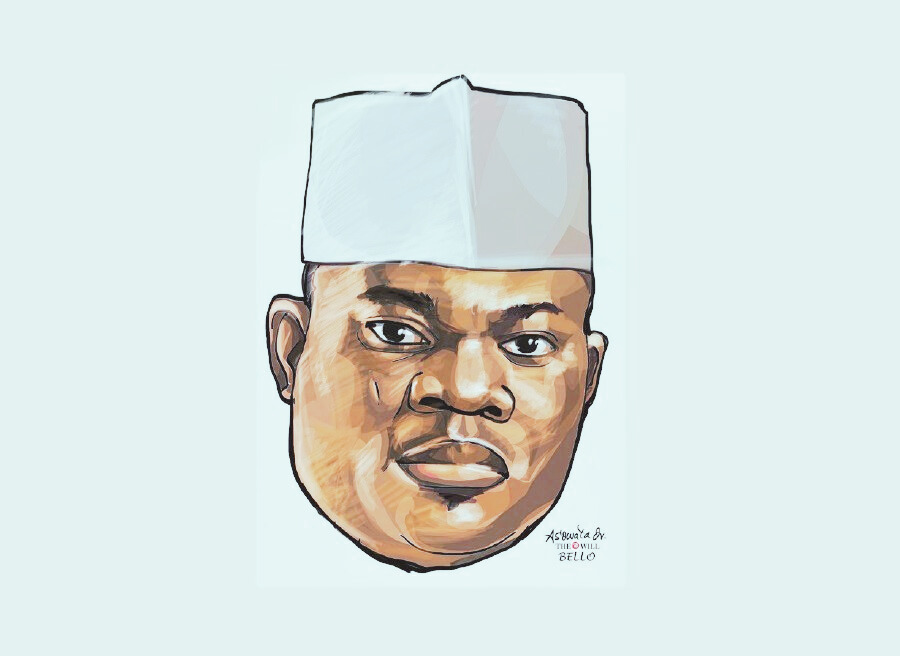September 22, (THEWILL) – The ongoing saga involving former Kogi State Governor, Yahaya Bello and the Economic and Financial Crimes Commission (EFCC) highlights significant challenges in Nigeria’s fight against corruption. The inability of the EFCC to effectively prosecute Bello, despite allegations of massive financial misconduct, raises serious questions about the agency’s effectiveness and the state of the rule of law in Nigeria.
The case against Bello centres on allegations of money laundering amounting to N80 billion during his tenure as governor. Despite the severity of these charges, Bello has managed to evade arrest and prosecution through a combination of legal manoeuvres and apparent political protection. This situation has created a public spectacle that undermines confidence in Nigeria’s anti-corruption efforts.
The events of September 18, 2024, exemplify the confusion and ineffectiveness surrounding this case. Conflicting reports emerged about Bello’s interactions with the EFCC. His media team claimed he voluntarily visited the EFCC headquarters to honour an invitation. They released photographs and video clips showing Bello at what appeared to be the EFCC premises, accompanied by his successor, Governor Usman Ododo.
However, the EFCC quickly contradicted this narrative. In a statement, the commision’s spokesman, Dele Oyewale, denied that Bello was in their custody, insisting that the former governor remained wanted with “a subsisting warrant for his arrest.” This contradiction between Bello’s claimed cooperation and the EFCC’s denial of his presence creates a puzzling scenario that fuels public scepticism about the entire process.
The situation became even more chaotic later that evening when Bello’s media office reported that EFCC operatives had surrounded the Kogi State Government Lodge in Abuja, attempting to forcefully arrest the former governor. They described a “gestapo-like attack” with operatives firing gunshots, raising the alarm about potential harm to Bello. This dramatic turn of events, if accurate, suggests a disorganised and potentially dangerous approach by the EFCC.
These conflicting accounts and the apparent inability of the EFCC to carry out a straightforward arrest warrant point to deeper systemic issues. The case exemplifies a troubling pattern in Nigeria where high-profile political figures seem able to operate above the law, using their connections and resources to frustrate legal processes.
The EFCC’s handling of the Bello case contrasts sharply with its approach to less politically connected individuals. There are numerous instances of swift and aggressive action against suspected internet fraudsters, locally known as “Yahoo boys.” This disparity in treatment creates a perception of selective justice, where the agency appears more retributive towards ordinary citizens while struggling to effectively prosecute politically exposed persons.
This inconsistency undermines the EFCC’s credibility and the broader fight against corruption in Nigeria. It reinforces public cynicism about the genuine commitment of authorities to hold powerful individuals accountable for their actions. The perception that there are different sets of rules for the political elite and ordinary citizens erodes trust in public institutions and the rule of law.
The Bello case also highlights the complex interplay between federal and state powers in Nigeria’s federal system. The involvement of the current Kogi State Governor, Ododo, in apparently shielding Bello from arrest raises questions about the limits of state executive power and its potential misuse to obstruct federal law enforcement.
Moreover, the legal manoeuvring employed by Bello’s team, including attempts to transfer the case to different courts and jurisdictions, demonstrates how the judicial system can be used to delay and potentially derail prosecution. While everyone has the right to due process, the ability of wealthy and powerful individuals to exploit legal technicalities to avoid facing charges undermines the principle of equality before the law.
The EFCC’s struggles in this case point to broader institutional weaknesses. The agency appears to lack the necessary tools, legal backing, or political support to effectively pursue cases against high-profile political figures. This deficiency calls for a comprehensive review and potential reform of Nigeria’s anti-corruption framework.
Several steps could be taken to address these issues: Legal reforms to streamline the prosecution of corruption cases, closing loopholes that allow for endless delays and jurisdictional disputes; strengthening the independence and resources of the EFCC, insulating it from political interference and providing it with the necessary tools to investigate and prosecute complex financial crimes; improving coordination between federal and state law enforcement agencies to prevent situations where state powers are misused to obstruct federal investigations; enhancing transparency in the judicial process for high-profile cases, ensuring public scrutiny and accountability while implementing stronger asset declaration and verification processes for public officials to prevent and detect illicit enrichment.
The Bello case is not an isolated incident, but rather a symptom of deeper systemic issues in Nigeria’s governance and legal structures. Similar patterns can be observed in cases involving other former state governors and high-ranking officials, where prosecutions drag on for years without resolution.
This persistent failure to hold powerful individuals accountable has far-reaching consequences for Nigeria. It perpetuates a culture of impunity among the political class, discourages foreign investment due to perceived high levels of corruption, and deepens public disillusionment with democratic institutions.
Furthermore, the inability to effectively prosecute grand corruption cases hampers Nigeria’s economic development. The vast sums allegedly misappropriated in cases like Bello’s represent resources that could have been used for vital public services and infrastructure development. The loss of these funds to corruption directly impacts the quality of life for ordinary Nigerians.
The international community is also watching. Nigeria’s struggles with high-level corruption affect its standing on the global stage and its relationships with international partners. Persistent failures to address these issues could lead to increased scrutiny and potential consequences in areas such as foreign aid and investment.
To move forward, Nigeria needs a renewed commitment to the fight against corruption at all levels of government. This requires political will from the highest offices to empower and support anti-corruption agencies in carrying out their mandates without fear or favour.
Civil society and the media also have crucial roles to play. By maintaining pressure on authorities and keeping these issues in the public eye, they can help prevent cases like Bello’s from fading into obscurity. Public demand for accountability is a powerful force for change.
The judiciary must also introspect on its role in either facilitating or hindering the fight against corruption. Judges need to balance the rights of the accused with the public interest in seeing justice done, ensuring that legal processes are not unduly exploited to evade accountability.
The case of Yahaya Bello and the EFCC’s struggles to bring him to justice must serve as a warning about the state of anti-corruption efforts in Nigeria. It reveals deep-seated problems in the country’s legal and political systems that allow powerful individuals to operate with apparent impunity. This must change.







